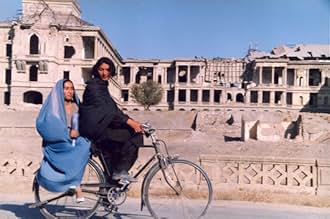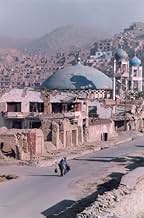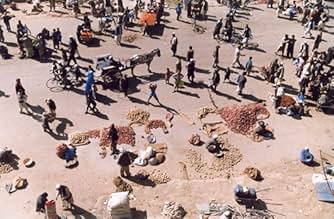PUNTUACIÓN EN IMDb
6,8/10
1,6 mil
TU PUNTUACIÓN
Añade un argumento en tu idiomaIn a post-Taliban Afghanistan a young woman (Agheleh Rezaie) attends school against her conservative father's will, hoping to learn more about democracy to fulfill her dream of being the cou... Leer todoIn a post-Taliban Afghanistan a young woman (Agheleh Rezaie) attends school against her conservative father's will, hoping to learn more about democracy to fulfill her dream of being the country's next president.In a post-Taliban Afghanistan a young woman (Agheleh Rezaie) attends school against her conservative father's will, hoping to learn more about democracy to fulfill her dream of being the country's next president.
- Dirección
- Guión
- Reparto principal
- Premios
- 4 premios y 2 nominaciones en total
Reseñas destacadas
In a devastated Afghanistan post-Taliban, Nogreh is a woman that goes to a school without the knowledge of her conservative father that sees blasphemy everywhere. She dreams on becoming President of Afghanistan, but wears burqa and fears her father; she is interested to know whether there are other women presidents further to the Pakistani prime-minister Benazir Bhutto; and she wants to know their speeches to be elected president. Nogreh wanders with her father and her sister-in-law Leylomah with her baby in a buggy with their old horse. Leylomah is seeking-out her missing husband Akhtar and has problem to feed her baby due to her own starvation. Along their travel for survival, they see their country devastated by war and misery.
"Panj É Asr" is a very sad tour though Afghanistan, a country devastated by the civil war, the successive invasions and war against Russians and Americans and the Taliban regime since the 70's. It is impressive to see only ruins of former cities and palaces, and the poor and illiterate people dying without food or water. The ignorance of the common people and the treatment to the women are also amazing. This movie is a sort of documentary and despite the lack of resources and the flawed screenplay, the director Samira Makhmalbaf has the merit of exposing these wounds to the world. My vote is six.
Title (Brazil): "Às Cinco da Tarde" ("At Five in the Afternoon")
"Panj É Asr" is a very sad tour though Afghanistan, a country devastated by the civil war, the successive invasions and war against Russians and Americans and the Taliban regime since the 70's. It is impressive to see only ruins of former cities and palaces, and the poor and illiterate people dying without food or water. The ignorance of the common people and the treatment to the women are also amazing. This movie is a sort of documentary and despite the lack of resources and the flawed screenplay, the director Samira Makhmalbaf has the merit of exposing these wounds to the world. My vote is six.
Title (Brazil): "Às Cinco da Tarde" ("At Five in the Afternoon")
What made me write the comment about this film was the post signed by "ingemli". It is easy bullshitting arrogantly about this film while sitting in the air-conditioned cinema, eating pop corns and feeling sleepy. Samira Makhmalbaf went to Afganistan after the Taliban regime was toppled, and decided not to stay a silent observer of a hard life she faced with. Together with her famous father (Mohsen Makmalbaf wrote over 30 scenarios and directed about 20 films) she developed the script and was determined to film it in Afghanistan. It was difficult to find the actors, especially a native woman who would interpret the main character who shows her face, as the country lacks professional actors. Keeping all this in mind, it all ended pretty well with non-professionals. I am not telling that this film is a masterpiece, but it has its value and deserves respect. This is a tale of a young woman who, despite his father's religious fanaticism and prohibition that she goes to school, insists to get educated to become "the president of the republic". She goes to school without her father's knowledge, putting on the white high heels and uncovering her face. The shoes, actually pretty ugly and unsuitable for walking through the ruins, have strong symbolic meaning of her rebelled femininity. Ms. Makhmalbaf follows her heroine and hers family through the hard times of loosing illusions about the possibility not only for social advancement but simple survival. I knew this strange country only by bad news on TV. This film served as a window on its other, hidden side the ordinary people's life struggle and that's its most admiring part.
Nogreh (Agheleh Rezaie) is a young woman living in a post-Taliban Afghanistan. She ultimately seeks to be educated, and finds solace in a girl school promoting new ideals and attitudes to women. Even though the Taliban have been defeated in the country, old ways are still present and burqa's are still preferred. She lives with her Conservative father and her sister-in-law Leylomah, who is searching for her missing husband who has not returned from war. Also, Leylomah has a baby who she is struggling to feed after her milk dries up. Amongst these struggles, Nogreh is running for class president and uses a Pakistani refugee to help with her ultimate goal which is to become President of Afghanistan.
The title comes from Federico Garcia Lorca's poem Lament for Ignacio Sanchez Mejias, which tells the story of a famous bullfighter tragically coming to an end in the ring. It is repeated several times by the Pakistani character named 'Poet' (Razi Mohebi). Mejias was a real and popular figure in Spain, who returned to bullfighting after a long spell out only to be killed. The character of Nogreh has high hopes after Afghanistan is rejuvinated only to be disappointed by a country set in its ways. Although it is clearly an improvement, attitudes to women are still the same and are seen as the inferior sex. This is most evident in the scene where she poses for photographs which she plans to use in her class president campaign, only to have the photographer laugh in her face upon discovering she wants to eventually run for President of the country. While Lorca's poem is tragic and romantic, At Five in the Afternoon is observant and naturalistic.
It would be easy, given the recent history of Afghanistan, to weave a tale of despair and woe, but director Samira Makhmalbaf tells a story that is full of hope. This hope comes from the character of Nogreh, who is brilliantly portrayed by Rezaie. Although she is ultimately looked down upon, and is scared of her father finding out about her radical attitudes, she is determined, and represents Makhmalbaf's hope of a new generation of women that will rise up and compete against the men who have dominated the country for years, and have ultimately led to the deaths of thousands of its inhabitants and many wars. The underlying messages aren't rubbed in your face; they are instead laid out in real situations. The film won Jury Prize at Cannes, and is a shining light in what will hopefully become a New Wave in Middle Eastern film-making - God knows they have stories to tell.
www.the-wrath-of-blog.blogspot.com
The title comes from Federico Garcia Lorca's poem Lament for Ignacio Sanchez Mejias, which tells the story of a famous bullfighter tragically coming to an end in the ring. It is repeated several times by the Pakistani character named 'Poet' (Razi Mohebi). Mejias was a real and popular figure in Spain, who returned to bullfighting after a long spell out only to be killed. The character of Nogreh has high hopes after Afghanistan is rejuvinated only to be disappointed by a country set in its ways. Although it is clearly an improvement, attitudes to women are still the same and are seen as the inferior sex. This is most evident in the scene where she poses for photographs which she plans to use in her class president campaign, only to have the photographer laugh in her face upon discovering she wants to eventually run for President of the country. While Lorca's poem is tragic and romantic, At Five in the Afternoon is observant and naturalistic.
It would be easy, given the recent history of Afghanistan, to weave a tale of despair and woe, but director Samira Makhmalbaf tells a story that is full of hope. This hope comes from the character of Nogreh, who is brilliantly portrayed by Rezaie. Although she is ultimately looked down upon, and is scared of her father finding out about her radical attitudes, she is determined, and represents Makhmalbaf's hope of a new generation of women that will rise up and compete against the men who have dominated the country for years, and have ultimately led to the deaths of thousands of its inhabitants and many wars. The underlying messages aren't rubbed in your face; they are instead laid out in real situations. The film won Jury Prize at Cannes, and is a shining light in what will hopefully become a New Wave in Middle Eastern film-making - God knows they have stories to tell.
www.the-wrath-of-blog.blogspot.com
10WCS02
This movie tugged at my heartstrings delivering an unforgettable portrayal of Afghan life. It's a 10 out of 10, poetically revealing modern life in a city relegated to Neanderthal living conditions after the Taliban was sent packing.
The Film's title is the title of an extraordinarily relevant poem, recited twice during the film.
Though a tough way to learn Farsi (it's subtitled - phew!) "At Five in the Afternoon" awakened me to the plight of the poor souls coping with the rubble and 19th century technology.
The film describes (teenaged) Noqreh's life as she attends school and struggles to discover her role in society now that "any" job is within her reach. She decides to become the country's President.
The zesalots may be gone ... but there's plenty of cranky, old, conservative men (her father among them) who long for the "good ole'days". The country's problems (among them: live buried mines, religious extremism, the absence of basic social commodities - water / education - after several wars) serve as the antagonist as Noqreh's father carts her and her extended family across the Afghan dustbowl in search of her brother, The film moves slowly and deliberately, but I guarantee you'll be paid for your time investment with a once in a lifetime education about Afghanistan.
I hope you find a copy or a showing, and allocate the 2 hours to let it wash over you and take hold.
The Film's title is the title of an extraordinarily relevant poem, recited twice during the film.
Though a tough way to learn Farsi (it's subtitled - phew!) "At Five in the Afternoon" awakened me to the plight of the poor souls coping with the rubble and 19th century technology.
The film describes (teenaged) Noqreh's life as she attends school and struggles to discover her role in society now that "any" job is within her reach. She decides to become the country's President.
The zesalots may be gone ... but there's plenty of cranky, old, conservative men (her father among them) who long for the "good ole'days". The country's problems (among them: live buried mines, religious extremism, the absence of basic social commodities - water / education - after several wars) serve as the antagonist as Noqreh's father carts her and her extended family across the Afghan dustbowl in search of her brother, The film moves slowly and deliberately, but I guarantee you'll be paid for your time investment with a once in a lifetime education about Afghanistan.
I hope you find a copy or a showing, and allocate the 2 hours to let it wash over you and take hold.
Was not the sanction against Taliban led by the US to bring dawn into Afghanistan? Noqreh goes back and forth between her father, who believes neither education nor jobs are necessary for women, and the school, where teachers encourage female students to have any job, even the president.
Her family generously offers the place they live to the refugees coming back from Pakistan. Soon they have to go out from there, and without food, the dream of becoming the president fades out. Her white shoes become useless.
It seems the whole of the movie is a poem. That a high school girl dreams to become the president is a poem too. Maybe it is the best way to describe the world Noqreh lives in, which is at five in the afternoon, not in the morning.
How can the country, where just seeing the face of woman is sin, be open to the world? The country which was destroyed and lagged a long way behind the world by men, who are taught as superior creatures than women. Only the belief that God never dies supports them. Tough I have my belief as a Christian, I never want to shut myself away into the world of illusion.
Her family generously offers the place they live to the refugees coming back from Pakistan. Soon they have to go out from there, and without food, the dream of becoming the president fades out. Her white shoes become useless.
It seems the whole of the movie is a poem. That a high school girl dreams to become the president is a poem too. Maybe it is the best way to describe the world Noqreh lives in, which is at five in the afternoon, not in the morning.
How can the country, where just seeing the face of woman is sin, be open to the world? The country which was destroyed and lagged a long way behind the world by men, who are taught as superior creatures than women. Only the belief that God never dies supports them. Tough I have my belief as a Christian, I never want to shut myself away into the world of illusion.
¿Sabías que...?
- CuriosidadesSamira Makhmalbaf had difficulty casting the lead role of Nogreh because many women refused to appear on camera without their burqa. Agheleh Rezaie was her second choice after the initial woman she cast dropped out after Makhmalbaf said she would have to show her face to the camera.
- ConexionesFeatured in Lezate divanegi (2003)
Selecciones populares
Inicia sesión para calificar y añadir a tu lista para recibir recomendaciones personalizadas
Detalles
Taquilla
- Recaudación en todo el mundo
- 515.144 US$
Contribuir a esta página
Sugerir un cambio o añadir el contenido que falta



















